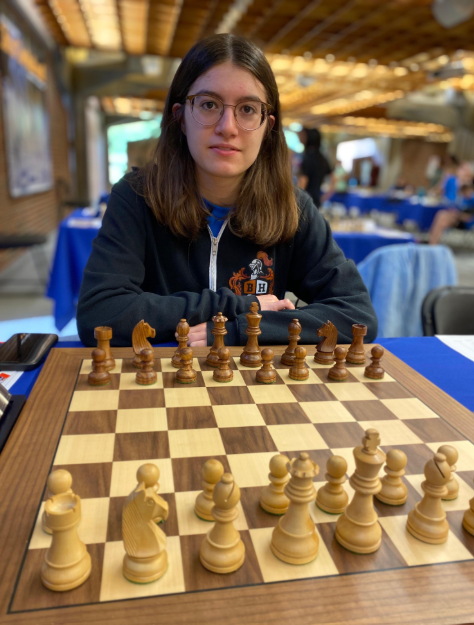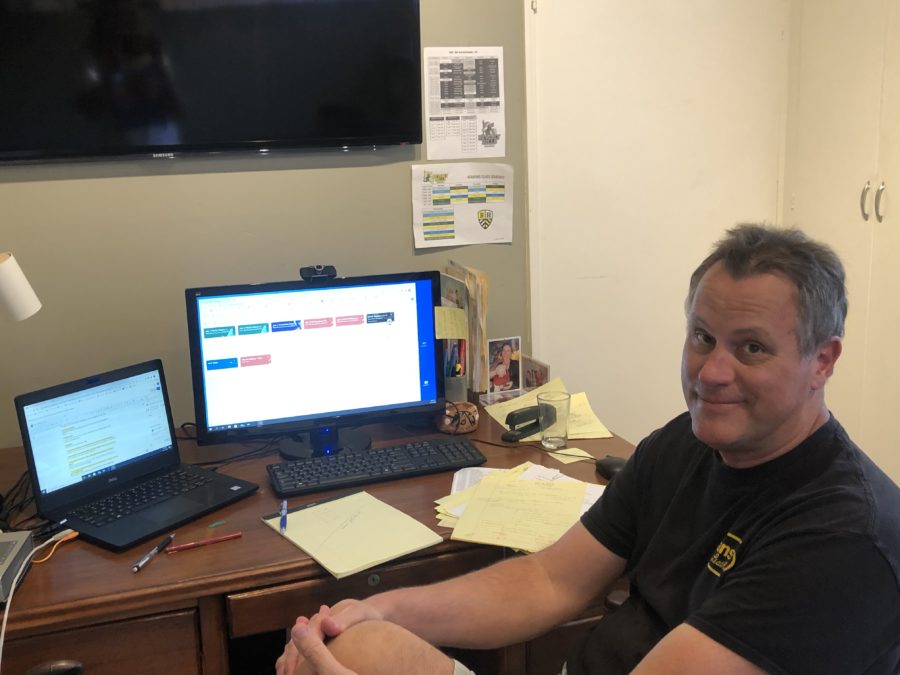Lillian Esagoff staff writer
Kate Kotlyar staff writer
Gina Toore staff writer
In March 2020, the world changed as a result of the COVID-19 pandemic. Stores closed, concerts stopped and school shifted to home learning, an uncharted territory for both students and teachers, though most have since adjusted to the circumstances.
Due to COVID-19 restrictions, BHUSD teachers utilize technology and teach students through distance learning. Some teachers, such as history teacher Pete Van Rossum, struggled to adapt because they “have had to fundamentally rethink [and] re-examine how” they do their jobs.
“It’s like I’m starting all over, it’s very time consuming…I try to have a good attitude about it, I just roll with it. I get frustrated like everybody. But I was laughing in my sixth period, [because] today sucked. I listed a bunch of things and talked about [things] today that didn’t go right, but I was like, ‘At least it is sixth period and Friday. Let’s roll with it and do this.’ I’m exhausted but I’m trying not to let it keep me down because there’s not much we can do about it,” physics teacher Kevin Bowers said.
The toll of exhaustion is not the only thing to negatively impact teachers.
“I get really sick of looking at screens, I get tired of it. I feel like I’ve spent my whole life looking at a screen. I’ve purchased some actual books to read, so I’m not looking at a screen. I get up at 5:00 a.m. every morning and I run, so physically I’m doing fine, so that hasn’t been a problem. My back does hurt by the end of the day, though, sitting in this chair and looking at the screen,” AP Music Theory and vocal music teacher Ethan Smith said.
As the Center for Disease Control and Prevention (CDC) states, COVID-19 can be stressful for many, including teachers.
“I had a meltdown yesterday. I average about a meltdown a month. If I can only meltdown about once a month, then I’m in pretty good shape. Things just build up and they catch up to you and then they just release themselves sometimes. So it has [affected my mental health],” BVMS math teacher Josh Schmidt said.
Now, people are cooped up together due to quarantine. Smith “has been together” with his wife “24/7 since March,” similarly to many other teachers.
“My family life has gone way down and my school life has gone way up. At a certain point I need to [tell myself] I need sleep, I need to eat, I need to hug my 5-year-old. There’s only so much I can do in a day. I will say there’s more stress. I’ve had more little nitpick arguments with my wife than we normally do, like today we got a little argument about who’s gonna make lunch. All I asked was, ‘Hey, do you want me to make lunch or do you have time?’ It’s just miscommunication because we just don’t have time to talk,” Bowers said.
As well as being teachers, many teachers are parents and have to “manage giving” their kids “enough attention,” third grade teacher Rachel Pearce said.
“[My son’s] always waiting for me to get done with school. Normally, he’d be doing after school activities, [but] now he’s waiting for [his] parents to get done with work so somebody will play with him. Normally I pay for after school care so I can keep doing my job, and then pick him up after he’s played with his friends and then we both go home together. It’s harder when he knows that I’m [home because he’s] like, ‘Come play with me! Come play with me!’ No, I [need to] get work done,” Bowers said. “I can’t drop him off at a friend’s house because of COVID. I love playing with my kid, I love it. It’s one of my favorite things. So it’s not like I don’t want to play with him, but I have to get work done.”
Building relationships with students is especially difficult because of the lack of “face to face contact” according to Van Rossum.
“What I don’t like is you miss a lot when you’re not with your kids in a classroom. You really strive for that feeling of, ‘Hey, I’m going to go to my period three class and these [students] are almost like my friends.’ We have an understanding, and you don’t get that [online]. And although I have gotten to know my students, it’s nowhere near the connection you would normally have. Time will solve some of those things, but you can never replace face to face contact,” Van Rossum said. “A lot of kids, they’re there, but they’re not there. There’s only so much I can do on my side of the screen. I can’t reach out and grab them.”
Although the science department “is almost like two separate departments” because of the division between physical and life sciences, according to Bowers, each science class still faces the challenge of executing labs.
“I’ve got some ideas coming up…I’m trying to think of household object type labs. [We’re] thinking about maybe bagging up some labs for people, but then it becomes a liability. Even if it’s baking soda, we get into liability issues too [because] what if…somebody puts a cork on [a baking soda and vinegar lab], the cork shoots off and hits them in the head. I know it sounds silly, but that’s a liability issue. If it was in class I’d be like, ‘What the hell are you doing? Why do you have a cork?’ I’d be there to grab it from them. I can’t do that with even 18 people [online] at once. We’re figuring things out as we go,” Bowers said.
Technology presents struggles because some teachers have been “resistant to technology,” said Van Rossum. But special education teacher Gregg Reisenberg believes “some people are going to be better teachers after the pandemic” due to utilizing technology in the classroom.
“I realized this year is sort of a building year. Going forward, at this point in my career, it’s kind of forced me to really rethink how I do everything, and that’s an easy thing to dodge. In other words, I think a lot of people are able to kind of avoid [technology],” Van Rossum said. “You kind of cruise, there have been things about the way I teach my curriculum that I need to rethink, I need to redo, modernize this issue. And now I’m having to do it. And in a sense, this distance learning thing is the push I’ve needed.”
Categories:
Teachers adjust teaching to COVID-19 regulations
October 16, 2020
History teacher Pete Van Rossum creates a workspace while he works from home due to Covid-19 restrictions. Photo courtesy of Pete Van Rossum
0
Donate to Highlights
$125
$1000
Contributed
Our Goal
Your donation will support the student journalists of Beverly Hills High School. Your contribution will allow us to purchase equipment and cover our annual website hosting costs.
More to Discover





























